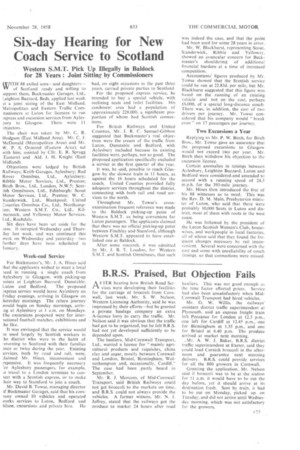Six-day Hearing for New Coach Service to Scotland
Page 61

If you've noticed an error in this article please click here to report it so we can fix it.
Western S.M.T. Pick Up Illegally in Baldock for 28 Years : Joint Sitting by Commissioners
WITH88 exiled sons—and daughters— IT of Scotland ready and willing to
iupport them, Buckmaster Garages, Ltd., Leighton Buzzard, Beds, applied last week it a joint sitting of the East Midland,
Metropolitan and Eastern Traffic Corn-ntssioners at Luton for licences to run mpress and excursion services from Aylesaury to Glasgow. There were 11 lbjectors.
The chair was taken by Mr. C. R. Hodgson (East Midland Area). Mr. C. J.
McDonald (Metropolitan Area) and Mr. W. P. S. Ormond (Eastern Area), sat with him, assisted by CUL E. R. Spragg Eastern) and Aid. J. H. Knight (East Midland).
Objections were lodged by British Railways; Keith Garages, Aylesbury; Red Rover Omnibus, Ltd.. Aylesbury; Ribble Motor Services, Ltd., Preston: Birch Bros., Ltd., London, N.W.5; Scot tish Omnibuses, Ltd., Edinburgh; Scout Motor Services, Ltd., Preston; W. C. 3tanderwick, Ltd., Blackpool; United 2ounties Omnibus Co., Ltd., Northampton; Western S.M.T. Co., Ltd., Kilmarnock, and Yclloway Motor Services, Ltd., Rochdale.
Six days have been set aside for the zase. It occupied Wednesday and Thurs day last week, and was continued this week on Wednesday and yesterdaytwo Further days have been scheduled in January.
Week-end Service
For Buckmaster's, Mr. J. A. Hines said that the applicants wished to meet a local aced in runninga single coach from kylesbury to Glasgow, with picking-up aoints at Leighton Buzzard, Dunstable,
Luton and Bedford. The proposed xpress service would leave Aylesbury on Friday evenings, arriving in Glasgow on. 3aturday mornings. The return journey would begin on Sunday mornings, Itrrivng at Aylesbury at 1 a.m. on Mondays. The excursions proposed were for inter-rational football matches, exhibitions and he like.
It was envisaged that the service would ae used largely by Scottish workers in he district who were in the habit of. -eturning to Scotland with their families Due or twice during the year. Existing ;ervices, both by road. and rail, were, :laimed Mr. Hines, inconvenient and :xpensive. It wasfrequently necessary or Aylesbury passengers. for example, :o travel to a London terminus to conwet with a Scottish express, or to make .heir way to Stamford to join a coach.
Mr. David B. Towse, managing director )f Buckmaster Garages, said that his corn)any owned 10 vehicles and operated works services to Luton, Bedford and 3ilsoe, excursions and private hire. He had, on eight occasions in the past three years, carried private parties to Scotland. For the proposed express service, he intended to buy a special vehicle, with reclining seats and toilet facilities. His catchment area had a population of approximately 228,000, a significant proportion of whom had Scottish connections.
For British Railways and United Counties, Mr. J. R: C. Samuel-Gibbon suggested that Buckmaster's real objectives were the cream of the traffic from Luton, Dunstable and Bedford, with Aylesbury included because its existing facilities were, perhaps, not so good. The proposed application specifically excluded a service in the first quarter of the year.
It was, he said, possible to reach Glasgow by the slowest train in II hours, as against the 16 hours scheduled for the coach. United Counties provided fully adequate services throughout the district, connecting with both rail and road services to the north, • Throughout Mr. Towse's crossexamination frequent reference was made to the Baldock picking-up point of Western S.M.T. as being convenient for Luton passengers. The applicants claimed that there was no official picking-up point between Finchley and Stamford, although Western S.M.T. appeared to have established one at Baldock.
After some research, it was admitted by Mr. J. B. T. Loudon, for Western S.M.T. and Scottish Omnibuses, that such was indeed the case, and that the point had been used for some 28 years in error.
Mr. W. Blackhurst, representing Scout, Standerwick, Ribble and Yelloway, showed an avuncular concern for Buckmaster's shouldering of additional financial burdens at a time of increased competition.
Accountants' figures produced by Mr. Towse showed that the Scottish service could be run at 22.83d. per mile, but Mr. BIackhurst suggested that this figure was based on the running of an existing vehicle and not on the cost. perhaps £6,000, of a special long-distance coach. There was, in addition, the cost of two drivers per journey. Mr. Towse considered that his company would break even on 17 passengers per journey.
Two Excursions a Year Replying to Mr. P. W. Birch, for Birch Bros., Mr. Towse gave an assurance that the proposed excursions to Glasgow would not exceed two per -year. Mr. Birch then withdrew his objection to the excursion licence.
Certain aneimalies in timings between Aylesbury, Leighton 'Buzzard, Luton and Bedford were considered-and amended to accord with a running speed of 24.5 m.p.h. for the 393-mile journey.
Mr. Hines then introduced the first of his 88 witnesses as to need.. This was the Rev. D. M. Main, Presbyterian minister of Luton, who said that there were probably 10,000 Scots in Luton and district, most of them with roots in the west coast.
He was followed by the president of the Luton Scottish Women's Club, housewives, and workpeople in local factories, all of whom said that they found the frequent changes necessary by rail inconvenient, Several were concerned with the cost and some with unreliability of coach timings, so that connections were missed.












































































































